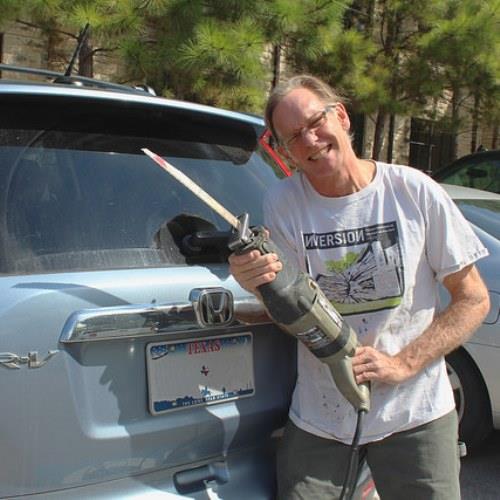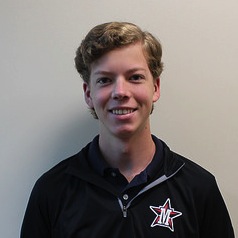Honda commercial leads art teacher to file lawsuit

Although art teacher Dan Havel owns a Honda CR-V, a commercial featuring the same make and model infringed on his Inversion House installation, as pictured on his shirt. Havel used power saws and similar tools to create ‘Inversion.’
November 6, 2014
Dan Havel and Dean Ruck are not in the demolition business, but they can tear apart houses with the best of them.
Art teacher Dan Havel and his artistic partner Ruck deconstructed and rebuilt two condemned houses on the corner of Montrose Boulevard and Willard Street in 2005.
The artists rearranged the wooden paneling of the houses to create a vortex shape that connected the two buildings through a narrow hallway and exited into a main courtyard.
The project, “Inversion,” quickly gained public attention. Over its six month installation, “Inversion” attracted visitors who crawled on all fours through the vortex and into the courtyard on the other side.
Havel and Ruck won the Art League Houston’s 2014 Artist of the Year award for “Inversion.”
Yet they also received some unwanted attention for their project. Honda Motor Company, in collaboration with advertising agency McGarryBowen and production company Rogue Films, produced a commercial depicting a Honda CR-V driving through a vortex in a house.
“They contacted us at the beginning through a woman who was hired by the ad agency to make the film,” Havel said. “She said ‘Hi, we’re fans of your work, and we had the idea of a porthole through a building in a commercial.’”
McGarryBowen sent Havel and Ruck a synopsis of the commercial, as well as a storyboard that included other artists’ depictions of vortex-like images.
“They said that we can’t copyright portholes through buildings,” Havel said. “We said that if it looks like ‘Inversion,’ then there will be a problem.”
The production company continued with the commercial, and the commercial aired in an ad campaign across Europe.
“They contacted us and told us that it was too late, that the commercial had aired and that they would give us credit for the commercial,” Havel said.
Since then, McGarryBowen has made several monetary offers of over $10,000 to Havel and Ruck, but the artists have continually refused them.
Havel and Ruck did so on the grounds that it was bad business practice.
“We believe that there was some deception involved,” Havel said.
Honda paid McGarryBowen $40 million for the Europe-wide advertisement, which was narrated by Garrison Keillor.
“When we found out about this, we decided that we needed legal advice,” Havel said. “Our lawyers said that the typical profit margin of such a deal is 20%, and 20% of 40 million is 8 million. We have a legal right to that.”
Havel believes that the house used in the commercial is nearly identical to “Inversion” itself.
“I did this early on, and this is where it got kind of spooky,” Havel said. “I overlapped photographs of ‘Inversion’ on top of the house that they used in the commercial to see where they placed the dartboards, and the pictures matched up exactly.”
Havel’s legal counsel could not comment on the compensation Havel would receive if he wins the case.
“Would it be great to get a big windfall? Sure, it would be great,” Havel said. “But that’s not what this is about.”
Honda’s alleged copyright infringement could set a precedent for others who are tempted to “borrow” artwork.
“We’ve been burned once, and we could be burned again,” Havel said.
The courts recently ruled against Honda and Ruck suing Honda, but they won the jurisdictional battle to pursue legal recourse against McGarryBowen and Rogue Films in the United States.
Havel’s attorney Arthur Feldman said that the defendants were hoping to force the artists to “travel to the far ends of the earth when their work has been knowingly copied.”
Havel Ruck Projects is an artist collaborative that was formalized into a limited liability partnership in 2009. In 2013, they applied for a copyright on the design of “Inversion.”
“I don’t think that the general design of a vortex is copyrightable, but their design of ‘Inversion’ is copyrightable,” Feldman said.
Before the commercial aired, Havel and Ruck had licensed the rights to the design of “Inversion” to Inversion Coffee House. Feldman states that creating an ad campaign was an illegal infringement on Havel and Ruck’s registered copyright.
“This case raises important questions over whether individual artists can maintain a suit against foreign commercial entities who knowingly infringed on these artists’ work,” Feldman said.
Amidst legal trouble, Havel has managed to maintain a sense of humor about his situation.
“It’s funny, because I drive a CR-V, and I love it,” Havel said. “It’s nothing against these people, but somebody was lazy on the design end and said ‘Let’s run with this, maybe they won’t notice.’”




